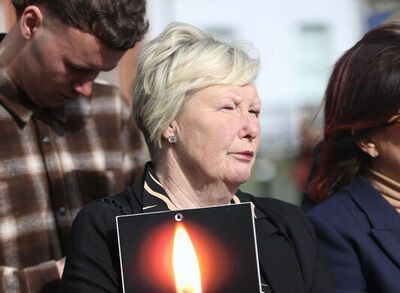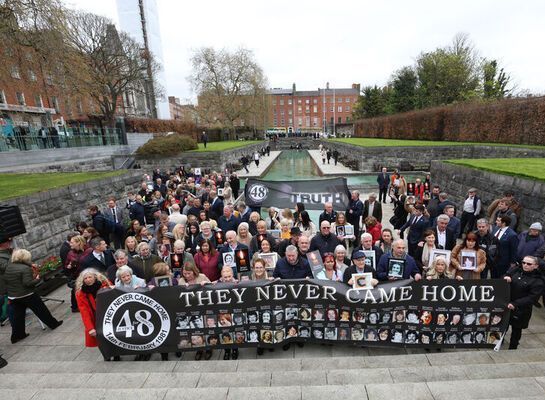[caption id="attachment_68794" align="aligncenter" width="600" caption="The Burns Library at Boston College, repository for the North Troubles oral history archives. "]
The coalition of Irish American groups spearheading the drive against U.S. Attorney General Eric Holder's subpoena of records in the Boston College Irish archives case has released its response to what it describes as "his inaction and indecision."
"Our nation's chief law enforcement officer," stated Seamus Boyle, National President of the Ancient Order of Hibernians, "has a duty, a legal obligation pursuant to the Mutual Legal Assistance Treaty, to oppose any request from a country (Great Britain) that is working night and day to corrupt the Irish peace process."
Boyle, in a statement accompanying the letter to Holder, pointed out that the record of Congressman Christopher Smith's most recent hearing was replete with documentation of "British efforts to undermine the rule of law and deny justice to the victims of their misrule."
Jim Cullen of the Brehon Law Society said: "Mr. Holder has chosen to ignore our request and, indeed, the requests of other members of Congress including the chairman of Senate Foreign Relations, by alleging he is constrained from acting due to litigation before the federal Court of Appeals, 1st Circuit. We know of no legal reason restraining him from withdrawing his subpoena, and there are ample policy reasons for doing so spelled out in MLAT documents."
President Thomas J. Burke Jr., National President of the Irish American Unity Conference, welcomed the support of senators and representatives "who have joined our appeal including Representatives Sires (D-NJ) and Murphy (R-PA) and Senators Lautenberg (D-NJ) and Lugar (R-IN)."
Continued Burke: "Our impression is that the litigation is being used by the State Department as a rationalization for inaction and inappropriate deference of important policy considerations to the Department of Justice's narrow focus on legal technicalities."
The coalition members also announced a nationwide "Contact a Consulate (British) campaign," this in addition to their appeals to members of Congress for letters of support.
Here is the text of the letter to Attorney General Holder: "This is a follow-up to our letters of October 20th of last year and January 26th of this year which you replied to, through Ms. Mary Ellen Warlow, Director of your Office of International Affairs, on December 8th and March 7th respectively.
"The letters were unresponsive to our request. We join again in asking for your withdrawal of the subpoena which you issued to Boston College pursuant to a request from the United Kingdom. Your letter noted your obligations to the United Kingdom pursuant to the Mutual legal Assistance Treaty (MLAT). We have asked that you first consider your obligations as the chief law enforcement officer of the United States. The actions we submitted for your consideration are, we believe, your primary obligation to the United States pursuant to the MLAT.
"The Treaty obligations that must be fulfilled on your part are three-fold and are included in the ratification documents. The Attorney General is to determine whether the request is for a legitimate prosecution of a crime, most notably, money laundering drug crimes cited frequently
in the Senate colloquy on the Treaty.
"Even the judgment of a former Chief Constable of the RUC, that a prosecution would be unlikely for the crime for which documents were requested did not persuade you that the request was suspicious and, in fact, politically motivated. In your capacity you are to determine if fulfilling the request would undermine the values that support the American justice system. Mr. Holder, Northern Ireland's legal system is to law what military music is to music. Juryless courts which the NYC Bar Association urged be abandoned in the 1990s remain in place and are proving useful in the imprisonment of political prisoners Gerry McGeough, a former candidate for office, and Marian Price, a political dissident whose views annoy the British.
"Moreover, the most casual observer of the conflict in Ireland quickly learns that the police force in the North was lawless and corrupt beyond measure and remains so to this day. So evident is this lawlessness that the Prime Minister of the United Kingdom, David Cameron, publicly admitted that there was collusion between the murderers of solicitor Patrick Finucane and the same police who now beg this favor of you. What message is the chief law enforcement officer of the United States sending to the rest of the world if it does the bidding of a police force who murders officers of the court Patrick Finucane?
"Solicitor Rosemary Nelson was murdered by the same hidden hand just months after testifying before Congressman Christopher Smith about the death threats to her from members of the police force in Lurgan, Northern Ireland. Your lightening-like issuance of not one, but two subpoenas
to such a contemptible police force is unthinkable and unconscionable. Finally, you are obligated to assess whether the fulfillment of the request would impair or conflict with important public policy of the United States. The United States has played a pivotal role in crafting and protecting the Irish peace process which resulted in the international treaty of 1998 and evolves precariously today.
"The threats to the peace process are manifest in the British failure to fulfill key justice provisions of the Belfast Agreement and its various codicils. They have chosen to ignore provisions dealing with the assassination of Patrick Finucane, the mass murder of the Dublin-Monaghan bombings and are doing what they can to bury the legacy of the Royal Ulster Constabulary in murdering hundreds of innocent Catholics.
If you had consulted with the Department of State in these matters, as Ms. Warlow's letter suggests, you no doubt were made aware of all the potential ways this request not only makes a mockery of the 1998 peace pact, but serves to embolden its dissidents. We would certainly appreciate a
copy of such a consultation with the Department of State, or a summary of it.
Ms. Warlow ends her letter suggesting further comment would be inappropriate as the matter is subject of litigation before the court. The litigation does raise important points with respect to the individuals seeking to be heard and the Attorney General's obligations. But, as noted
previously, we believe your primary obligations are much broader than those raised in the litigation.
"On the hand, the actions of United States Attorney General Carmen Ortiz in sending an ex parte communication to the Court of Appeals panel is an extraordinary attempt to influence the panel after arguments were finished. It is such actions by the Attorney General and not those requested by our organizations which are inappropriate and prejudicial.
We would appreciate the favor of any early reply to this request. If you have any question regarding the issues raised, please do not hesitate to contact us."
The letter is signed by Seamus Boyle, Thomas J. Burke Jr. and Robert Dunne, who is president of the Brehon Law Society.
The Boston College case centers on federal subpoenas seeking oral history archived material related to the Troubles that was given to the compilers on the understanding that the material would remain confidential until after the death of the material provider. The U.S. Department of Justice and the district Attorney in Boston have been acting based on a request for archived material from the Police Service of Northern Ireland.










